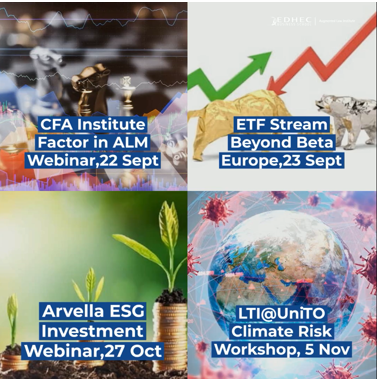
EDHEC-Risk invited to discuss important issues with the asset management industry
Written on 21 Dec 2020.

In the autumn of 2020, EDHEC-Risk Institute was invited to participate in over 10 events, a clear recognition of its globally acknowledged expertise in factor investing & sustainable investing by the investment management industry. Here is a short selection:
Webinar – Factor Investing in Asset Liability Management
Institutional investors have begun to recognize the importance of risk factors in asset allocation decisions, even though factor investing has had mixed results over the last few years.
Lionel Martellini, Professor of Finance at EDHEC Business School and Director of EDHEC-Risk Institute, has been working to combine the benefits of liability hedging and performance improvement through factor investing.
In this webinar, followed by over 700 professionals and organised by the CFA Institute, a global association of investment professionals, Professor Martellini explained how to integrate some of the most significant advances in institutional money management.
The recent study "Factor Investing in Liability-Driven and Goal-Based Investment Solutions", published by EDHEC-Risk Institute with the support of Amundi as part of the “ETF, Indexing and Smart Beta Investment Strategies” research chair, aims to establish a series of connections between factor investing and liability-driven investing.
Beyond Beta Europe Digital: Europe’s Biggest Factor Investing Event
On 23 September, Riccardo Rebonato, Professor of Finance at EDHEC Business School, and a leading expert in factor investing fixed income at EDHEC-Risk Institute, gave a keynote speech on Smart Beta Fixed Income.
Hosted by ETF Stream, this digital event brought together some of the brightest experts from across the quantitative investing landscape to explore a whole range of areas such as smart beta, factor and ESG investing.
During his presentation entitled "Factor Investing in the Time of Quantitative Easing", he examined the following issues:
- Factor investing from equities to other asset classes
- Quantitative easing and asset pricing
- The universal compression of ‘risk premia’
- The appeal and dangers of cross-sectional strategies
- The shift in the Fed’s monetary stance and what it implies for asset pricing and factor investing
9th ESG Investment Breakfast: Climate Change and Credit Risk
On 27 October 2020, Gianfranco Gianfrate, Professor of Finance, Head of the Impact on Climate Change of Financing and Investment Decisions programme at EDHEC-Risk Institute, conducted a webinar on the theme of climate change and credit risk at the 9th ESG Investment Breakfast hosted by Arvella Investments.
During the webinar, Prof. Gianfrate discussed the relationship between a firm’s exposure to climate risks, measured as the level of CO2 emissions and carbon intensity, and Merton’s distance-to-default, a measure of creditworthiness widely used by rating agencies and investors. He also addressed the policy implications and the threat that the exposure to climate risks poses to global financial stability.
Climate Change, Credit & Covid 19 Webinar
On 5 November 2020, Gianfranco Gianfrate, Professor of Finance at EDHEC Business School, introduced the event together with Elisa Luciano, Professor of Finance, Università di Torino and Director of LTI@Unito.
Hosted by Long-Term Investors@UniTO and EDHEC-Risk Institute, this workshop aimed to uncover the main challenges of integrating climate risk-related considerations into the credit risk assessment and the investment process of investors.
Riccardo Rebonato, Head of the Impact of Climate Change on Asset Prices and Risk Management at EDHEC-Risk Institute, gave a presentation on "Climate-Aware Asset Pricing" and examined the following issues:
- Are integrated assessment models useful for asset pricing? What do they imply for fixed income?
- Relative and absolute valuation of assets: picking winners and losers versus projecting economic growth.
- “Doing well while doing good” – Does it work? Does it make sense?

